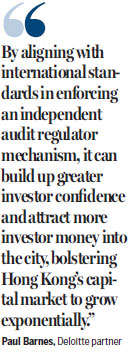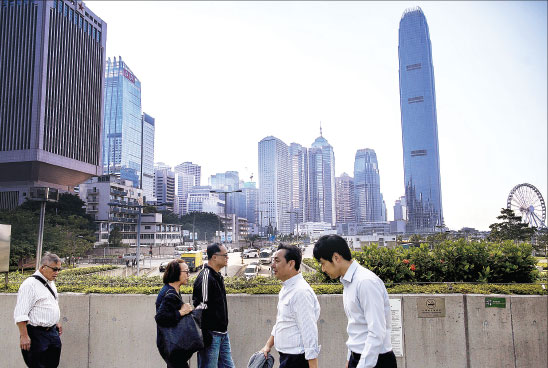Voices grow for independent audit watchdog to bolster capital market
Updated: 2016-11-09 07:26
By Oswald Chan in Hong Kong(HK Edition)
|
|||||||
Hong Kong has been flexing its muscles in the race to be the region's prime financial hub.
But, besides a simple tax regime, sound legal system, clean government and a high quality workforce, there's one mechanism that's essential and still missing in Hong Kong's fight for the crown amid stiff competition - an independent audit regulation.
This was echoed by a report entitled "Corporate Governance Watch 2016" report in September this year. The survey, conducted by investment bank CLSA and the non-profit-making Asian Corporate Governance Association (ACGA) found that the SAR's performance ranking trailed those of Australia and Singapore, mainly because the city lacks an independent audit regulator.
After more than three years' discussions on the amendment bill of regulation of listed company auditors, the Financial Reporting Council (FRC) - a statutory body established in 2006 under the Financial Reporting Council Ordinance - said last month the government planned to cement the council's role as an independent audit regulator for listed entities in Hong Kong and table the bill in the Legislative Council in 2016-17 legislative session.

Under the amendment bill, the FRC will take over the functions of inspecting, investigating and disciplining auditors of listed entities. In addition, it will independently oversee the Hong Kong Institute of Certified Public Accountants (HKICPA) concerning the registration of listed entity auditors, standard-setting on professional ethics, as well as professional development requirements for listed entity auditors.
The FRC now only exercises control over the auditor's investigating functions, while the remaining five functions are delegated to the HKICPA, which is an accounting profession body. This contravenes the requirement for IFIAR (the International Forum of Independent Audit Regulators) membership and EC (European Commission) equivalence that the oversight functions must be undertaken by an independent body comprising accounting non-practitioners.
Currently, there are 51 IFIAR members and 50 jurisdictions worldwide, including the Chinese mainland, which are in compliance with EC requirements. Hong Kong is not among either of them.
"Hong Kong's current status is embarrassing," laments FRC Chief Executive Officer Paul Winkelmann.
"There's no hindrance or reason as to why Hong Kong cannot become a jurisdiction, whereas there's an audit regulator mechanism," FRC Chairman John Poon Cho-ming said last month.
"By aligning with international standards in enforcing an independent audit regulator mechanism, it can build up greater investor confidence and attract more investor money into the city, bolstering Hong Kong's capital market to grow exponentially," says Paul Barnes, a partner at auditing advisory firm Deloitte.
The FRC commissioned Deloitte in late 2013 to conduct an independent audit report comparing Hong Kong with international standards and practices. The report had identified such a shortcoming.
After the government had finalized conclusions regarding consultations on improving the regulatory regime for listed entity auditors in June last year, the FRC again asked Deloitte to update the report. The updated version was released in October this year.
Global financial centers, such as New York, London, Paris, Frankfurt, Singapore and Tokyo, are all IFIAR members who comply with EC equivalence requirements.
"Hong Kong companies need to enhance the independence of audit regulators and promote corporate governance culture as two major strategic priorities to strengthen the local corporate governance ecosystem," ACGA Secretary-General Jamie Allen said in September.
In its 2014 Financial Sector Assessment Report, the International Monetary Fund recommended that Hong Kong push for a fully independent authority responsible for overseeing the audit profession and with strong enforcement power. Such authority should have jurisdiction over all auditors that audit companies listed in the SAR.
There are now some 2,000 listed entities in Hong Kong with a market capitalization of about HK$26 trillion.
"Better corporate governance procedures will lead to better corporate fundamentals. When companies have higher corporate governance scores, the check and balances instilled would enable companies to prioritize the cost of capital issue, resulting in lower earnings or balance sheet risks," reckons Shaun Cochran, global head of thematic research at CLSA.
Besides the idea of setting up an independent regulator of auditors, the amendment bill also proposes creating a new independent appeals tribunal to hear appeals against registration and disciplinary decisions made by the FRC.
Under the proposed amendment, any aggrieved person can appeal to the Court of Appeal against the decision of the independent appeals tribunal. At present, aggrieved parties can take their cases to the Court of Appeal if they are not satisfied with the HKICPA's decisions.
The bill also stipulates that the FRC's operations will be funded by levies on an equal basis by the three stakeholder groups - listed entity auditors, listed entities and investors.
The FRC employs 22 staff, with the government having allocated HK$29.4 million in the 2016-17 budget to support its work.
oswald@chinadailyhk.com
|
A recent survey found that Hong Kong's performance ranking trailed those of Australia and Singapore, mainly because the city lacks an independent audit regulator. Justin Chin / Bloomberg |
(HK Edition 11/09/2016 page9)
